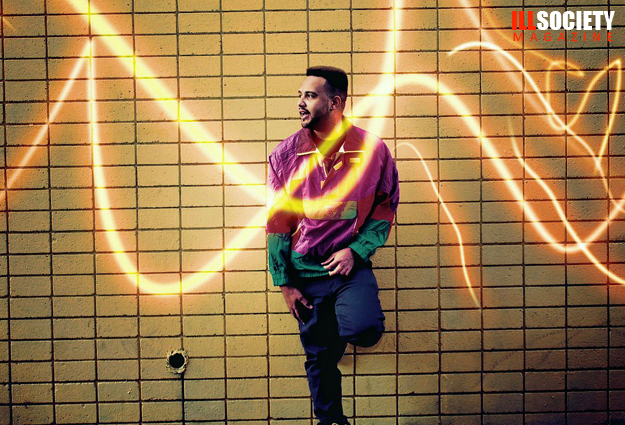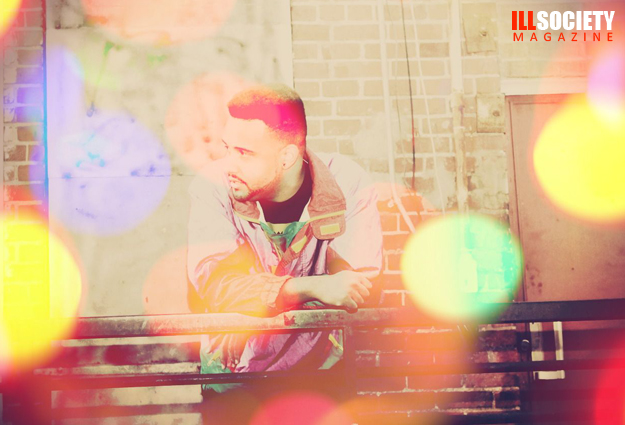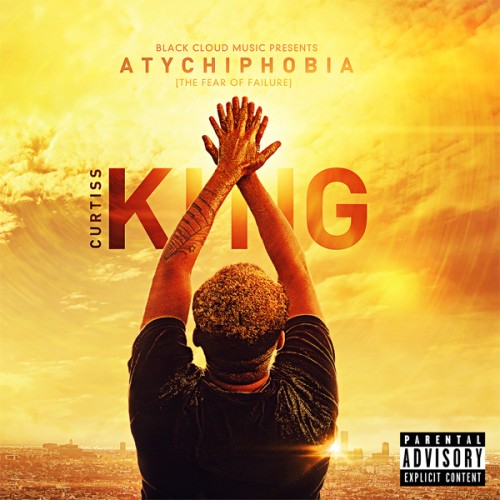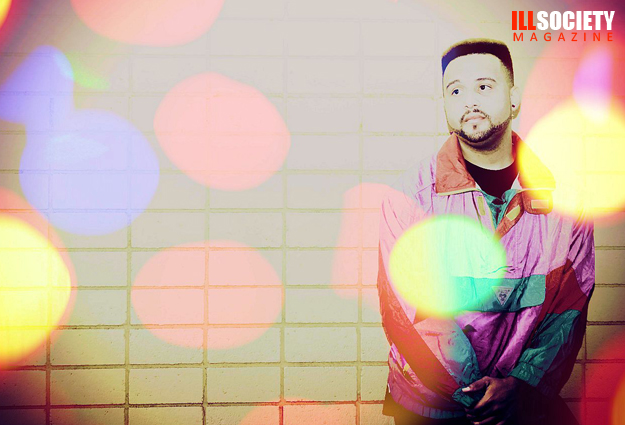


Interviewed by Stacie Fresh
It is undeniable that the two-toned flat-top wearing emcee, who’s t-shirt reads “sicker than the average” is anything but that. Curtiss King is like a breath of fresh air, from the way he dresses to the music he makes. Looking like he stepped straight out the 90’s from the outdated neon colored gear and printed shirts and the lyrical references, Curtiss is the epitome of 90’s nostalgia. With a series of accomplishments in the year of 2012, Curtiss King has gone from a minimal local buzz as a producer/emcee to being one of the hardest working men in the Inland Empire’s independent music scene, campaigning for 97 days and earning his way into one of the most sought after independent hip hop music festivals in the west coast, Paid Dues. Curtiss King has came a long way from being merely a producer and has used 2012 as a platform for growth as an artist. We caught up with the talented emcee and touched upon many subject matters from Curtiss’ childhood, love, the flat-top, and musical journey. Get to know a little about the King.
ISM: So first off, congratulations. You made a lot of moves in 2012.
Curtiss King: Thank you, Yep.
ISM: Curtiss King. The name can mostly be recognized by mediums of production, but the name is now receiving credibility on the mic. So the love for which came first?
Curtiss King: Umm, the love for the emcee side was always first. Actually when I started producing it was out of necessity, because I was tired of rapping over beats that everyone was already rapping on mix tapes. You know, like radio instrumentals. We rapped over Wu-tang’s “C.R.E.A.M.” and 50 Cent’s “In Da Club”, everything we could get our hands on, that I could find on mp3.com, which is like super throwback, then we started rapping over other producers beats. But the love came first for the emcee side, that’s why I started music, I needed a voice. I was always shy growing up, I was always the one that really didn’t speak up and music gave me an opportunity to speak up for myself and basically tell my story. Production came as a necessity and that was the thing that people seems to be latching onto at first, so I was like “just keep it goin’” (chuckles).
ISM: You talked about your childhood; can we get a little more in depth with that?
Curtiss King: Yep, absolutely.
ISM: How was it growing up?
Curtiss King: It was good. You know, I mean you have your normal struggles, where your family’s trying to make ends meet, but for the most part it was good. You know, umm, especially with moms, she gave me an opportunity to find myself- that’s where all this 90’s stuff comes from. From watching Nick at Nite, and all of these TV shows on Nickelodeon, I had the opportunity cause I was a latch-key kid. Mom was going to work and I’m at home watching everything from 3pm-to-11pm, just Nickelodeon shows or Fresh Prince of Bel-Air. That part of it was dope because I think my moms knew how to let me keep that innocence. You know, when you’re going through hard times, it’s really hard to protect your kids and not let them know everything that’s going on. But I loved that part of it. Growing up with my pops was a little bit more strict, you get that balance and it becomes who you are. But for the most part it was dope. But even back in Curtiss Middle School (that’s where I get my name from), I was super insecure. I used to get teased because I was tall, scrawny, awkward, and I didn’t like to speak up. When I spoke up, (begins to make a wailing sound), I had this high pitched voice and all of that, and like what do you do? I was just insecure. That’s it. For the most it was good though. Those insecurities and those type of reasons are the reason why everything is so outlandish now, cause I got an opportunity. Its like the kid that got a chance to speak- and now he has a lot to say as an adult.
ISM: I think that it is something we can all relate to, how did you find that confidence that let you be so outspoken and develop it into your art?
Curtiss King: you know what, my moms always tried to force it. We’d be at a family party and she’d try to make me sing or make me do a dance move, and I still wouldn’t, I was just too shy. But that really changed when I want to high school, I went to a different high school and nobody knew me there, so I had a chance to be who I always wanted to be.
ISM: New beginning.
Curtiss King: New beginning, you know like, try out some things. I wonder what would happen if I said this to this girl, “ohh she actually like that?! Oh man. If I would’ve said that back in middle school, I would’ve got slapped.” Things like that. But honestly I really owe it to one of my high school teachers, Mr. Bing, public speaking class. Never underestimate those classes, every week, no, every day we had to go up and speak in front of a group of people. And he made us write down what we were going to say and that really gave me a voice and opportunity to find who I am in front of people, and not be shakin’ or worried about what’s going on inside but more so about getting my point out and saying what I needed to say. That made all the difference.
ISM: When did you decide music was what you wanted to pursue?
Curtiss King: 17. Me and my best friend would always talk about rappers, buy the latest XXL’s, but what we didn’t know is that we both wrote poetry, and two teenagers ain’t gonna sit there and admit they write poetry. But one day I came across this book- “Man, you write?” he was like “yea” all shy. “Ever thought about rappin?”, I was like “nah-nah”. He said “we gonn’ do this. You write for 30 minutes. I write for 30 minutes, and see what we come up with.” And there started the career, literally over the phone. But it became serious when we said “what we gonna do this for?”, we can’t do this just to bullshit, we gotta do this for a reason. He said our family- he wanted to get his grand-momma a house, I wanted to get my momma a house. I want her to never have to work again. Even at that age that was the initial goal, and it still hasn’t changed.

ISM: You’re originally from Carson, but you rep the I.E. to the fullest, what’s the importance of representing the I.E.?
Curtiss King: I lived in Carson most of my life. I was raised/ went to high school in Downey. So I say, Carson raised me, Downey raised me but I.E. embraced me. You know when I was living out in Downey and Carson I was still trying to find myself, I was getting over those nerves getting over those insecurities. I was finding myself creatively in some ways and failing in other ways. But when I came out here it was like that high school thing that we talked about earlier all over again, fresh start. I got to come out here and try new things. It’s so doggy-dog out there too [L.A.] but the I.E. is so vibrant in culture. Out here people think about culture before they think about fashion. And L.A. is really a movie, fashion, then music scene. And coming out here, it’s music first. It’s a beautiful thing, I didn’t think that existed. Out here [IE] they love local acts. Of course I gotta rep the I.E., this is where the emergence of me as an emcee really took off. The I.E. is what made me a man, made me the artist that I am now. So,
I rep to the fullest.
ISM: And this is where you teamed up with Black Cloud.
Curtiss King: Black Cloud Music. That’s where I met my brothers. That’s where I met Noa James and my sister Lesa J, Jynxx, and everybody else from Black Cloud. If I never met them I’d be lost out here.
ISM: Paid Dues 2012. You campaigned for 97 days in a effort to get on. How did it feel when you got that call telling you that you had made it on the bill?
Curtiss King: It’s crazy when I got the call Jynxx slipped up and told me almost. He was like “did you get a call today from Murs?” I was like “why? Why Jynxx?”. He said “no reason, just know that today is a good day”. When I got that call from Murs finally, so many emotions came over me. A part of me wanted to just tear up, as a man I can admit that, I wanted to tear up cause folks don’t understand how much of a battle it was to get here that wasn’t music. A lot of the battle was you know, my own self esteem, my self confidence, getting myself to a place where I could express myself in a proper way and still make it look nonchalant and cool. It was a journey and Paid Dues Justified that journey. I got up on that stage and it was like clocking in to a job that you love. Everything was over in a heartbeat. 14 minutes that I performed, it was over in a heartbeat. But one of the dopest moments of my life honestly, shout out to Murs and Guerilla Union for that opportunity.
ISM: Definitely, was that the moment you realized that your music is expanding outside of the I.E., because Paid Dues is one of those festivals where people from various parts of the country and cities come to experience Hip Hop. So…
Curtiss King: True. What it put in perspective is that I do have a lot of support. Seeing all those different faces, people asking for pictures it was like “damn” its real! And now I have a responsibility to do this music for the people. They got me there, I didn’t get there because of my grind. The grind means nothing if nobody else is seeing what’s going on. It’s just dope to see all of those faces and races be affected by a dude with a flat-top. Literally the dude with the flat-top that just wanted to be heard.
ISM: (chuckles) So, since we’re touching subject on the flat-top, how long have you been rocking the flat-top?
Curtiss King: Since Noa James was on Paid Dues in 2010. Somebody told me that they noticed my music was very nostalgic, and I’m like “damn I do make a lot of 90’s references” but I didn’t look like that. I would get on stage and rap and as soon as I got off people would forget who I was cause I looked like everybody else, something had to change and the flat-top was the first step. I put the little blonde on top and started wearing the Sinbad-ish shirts and people were like “I get it Curt, I get it.” My music was taking chances but my outside was still that scared kid, that was afraid of getting noticed, but I was like “fuck it, gotta do me, gotta be me”.
ISM: And you’re good at that. Really good at that.
Curtiss King: Thank you.
ISM: You’ve been doing music for a while now, about 15 projects deep including beat tapes, mixtapes, EP’s, but you now released your debut album Atychiphobia (The Fear of Failure). Is there a project in particular that you feel prepared you for your debut?
Curtiss King: DIY. I say Atychiphobia is DIY on steroids.
ISM: I want to talk about the album cover of Atychiphobia. It’s a very powerful cover. You got the sun giving a very beautiful golden hue, you got the city right in front of you, and you’re hands are placed upon the sun it seems like. Did you have a specific vision for the cover?

Curtiss King: I know I wanted to incorporate the hands. If you look at the hands, they make up a crown. I make music for what I call Kings & Queens (fans). We’re all kings & queens. And it’s gold because gold is such a royal color. And if you notice there’s two suns, one right above my hands and the other coming around my stomach. If you look at the city it looks like L.A. from a distance, you can look at it as I’m shining because of L.A. or because of the Inland Empire (behind).
ISM: Listening to the album, I think that it’s uplifting and inspiring. It’s like a testimony from you of how you got where you’re at now. It inspires to follow dreams. Was there a specific concept for Atychiphobia?
Curtiss King: I wanted to make music that did something for your soul. I wanted to make an album that felt warm. And it’s partly inspiring but like you said, it’s more so about the testimony because I feel like a lot of rappers ignore some of the stories that they went through for entertainment sake. I really wanted to capture how I was feeling before Paid Dues when I didn’t have shit. But then again you got a couple songs on there like “Ratchets still Jockin” and “Fvck Cancer” – I really wanted to give y’all that balance. The thing is that a lot of music can be detrimental to your soul, I didn’t want to be a part of that. I wanna be a part of something that actually get’s you through. Sade- call it uplifting, call it want you want, that shit gets me through my hardest times. When I feel like there’s no other options I listen to her, and I feel like she’s talking to me, and if I could do that for y’all through a hip hop format, let me try at least
ISM: You’ve mentioned Sade, and I’ve notice from past interviews and even now that you very much respect this woman and her music. And you even got a song on Atychiphobia titled “Sade.Badu.Jill” what do these women mean to you?
Curtiss King: (breaks in to reciting the hook) “when I listen to Sade on a real shitty day and I bump Badu when a nigga feelin’ blue that’s my remedy and when I listen to Jill Scott right before I feel lost this music is my medicine so even when I fall that’s my remedy” When I found Badu, especially that Baduizm album, and found Jill Scott’s first album and Sade’s greatest hits… Pshhhh… if it wasn’t for that I probably wouldn’t be doing music myself. When you find you’re calling then you gotta run with it, and I feel like those women helped me do that. Those women mean a lot to how I make music right here and right now in 2012.
ISM: If you had to chose one track off of Atychiphobia as your favorite which would it be?
Curtiss King: Easy. “Sade.Badu.Jill”. That was me stepping out my comfort zone, you know Curtiss King music, I don’t ever harmonize like that. This is me at my lowest point and this is the song that I was singing to myself. It’s the most sincere one on that project.
ISM: I noticed that your production is only behind only one song on this album. Did you feel the need to be more laid back with your production work on this album to give a platform to other producers?
Curtiss King: Not necessarily for the platform, I did it because those are all dope producers in their own right. Like J Bizness has produced for Little Brother, Ras Kass, and Tae did all that stuff for TDE and Hutch did stuff on GKMC (good kid, m.a.a.d. city). I just wanted to get music that I couldn’t do, I listen to those beats, I can’t do those beats. I have my style, they got theirs. They described it to any producers that wanted to produce on this project as “Sade with a shank”. Smooth, that’s the Sade aspect, and my lyricism and slight distortion, that’s the shank. And I just really needed people to focus on me as an artist and my story.
ISM: Most of the album I feel is personal, but I want to talk about “Post it Note 1”. You’re very openly expressive of the love you have for your lady. I’ve noticed it at shows, she’s always there right by your side. I’ve noticed it on the mini Kings & Queens documentary, and even in your music. How important is her role to the man you are now and the man you plan to become?
Curtiss King: (with a very contagious smile) It’s very important because she was really the first woman who really embraced me at where I was at. I had a really good local buzz, but the women I was coming across was like “oh you aint’ got no car? You ain’t got no job? Dreams can’t buy nothing right now”, she was really the first one that liked me as a person. She didn’t want to get to know Curtiss she wanted to get to know Dwan. I can show my love for her because she’s been there for me through some tough ass times. And there is no reason to lie about the real. She understands the dream, she’s there for it. She’s a major part, so I always show my love publicly. And it’s a ego thing in hip hop where they don’t show the’re love for there woman, To me that’s some cowardly shit. You gotta show your love for your rock, you’re back bone. I say my woman is important to me. Especially when she’s ride or die, you got to. The thing is, I made “Post It Note 1”, so that I can continue it every album, and you can be the first one to know this.
ISM: I think that’s beautiful that you express yourself about her in that way and are able to admit the love. I see you guys on stage or wherever, and it’s evident that there’s a strong supporting bond, and that you appreciate her. A lot of rappers don’t care to show that side.

ISM: If you had to choose 5 artists to collaborate with, dead or alive, who would they be?
Curtiss King: Tupac. Andre 3000, E-40. Sade. Badu.
ISM: What about producers? 5 producers.
Curtiss King: (grunts) that’s where it becomes more difficult. Umm, Neptunes, Timbaland, College Dropout Kanye West, Just Blaze, and umm damn you really making this difficult, and I’ma say 9th Wonder.
ISM: Name 5 artists that you have in rotation right now.
Curtiss King: Kendrick Lamar GKMC. Ab-Soul Control System. Danny Brown XXX. E-40 Ghetto Report Card. & Sade Greatest Hits.
ISM: How do you feel about the music coming out the west coast right now?
Curtiss King: As a whole I think this shit is beautiful. I think we have a lot of variety and I think that for the first time the west coast is embracing each other’s variety. It represents our generation- the ipod generation- where you can have Kendrick Lamar and Coldplay in the same playlist. In terms of Cali I really love what we’re doing, it represents everything.
ISM: I feel like a lot of people set boundaries between mainstream hip hop, underground hip hop, and what is “real” hip hop . How do you feel about those categories music is placed in?
Curtiss King: I can’t set boundaries on music that affects the soul. I really think underground and mainstream is a state of mind, state of mind in terms of how open you want to be. I feel like people who just listen to the radio are just as closed minded as the people who only listen to the underground. I feel like it’s music. We go through the same thing, snares and kicks, yeah we talk about different things but it’s music, those dividends shouldn‘t be there. You can show me some dope shit from Madlib or new shit from Kanye, if that shit hits, I’ll listen. I just can’t put those restrictions on music.
ISM: So were wrapping up 2012, like I mentioned before you accomplished a lot this year. Do you feel accomplished?
Curtiss King: I feel like there’s still so much work to be done. I need to go out on tour, I need to experience different places, need to make sure that people know about Black Cloud and what we‘re trying to do. I’m happy. I’m excited for what’s to come. But there’s still so much work to do.
ISM: You have a dope album and thank you for your time.
Curtiss King: Thank you. I appreciated y’all.
Make sure you cop Atychiphobia (the fear of failure) now on iTunes.
-Stacie Fresh
Photos taken by Cali Grindz
Photos edited by Courtney Laurenetano